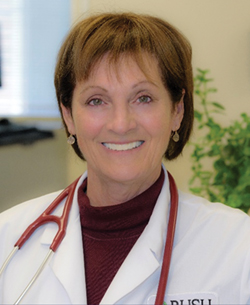By Richard Gunderman, MD, PhD
| |
|
 |
| |
|
Marie Brown, MD
Internist, Director, Practice Redesign for AMA
|
As one of the featured speakers at this year’s second annual ISMA Physician Wellness Symposium on Friday, September 26, Marie Brown, MD, will provide insights from the American Medical Association’s STEPS Forward program. A practicing internist and professor at Rush Medical College, Dr. Brown will lead a two-hour afternoon workshop focusing on how physicians can improve the health and well-being of patients by improving the health and well-being of physicians and their practices.
Dr. Brown cites a 2014 RAND study that found the ability to provide great care is the number one driver of physician satisfaction. Conversely, preventing physicians from using their medical judgment to provide appropriate care discourages physicians. “We know that physicians love taking care of patients, are not afraid of hard work, and possess sufficient resilience. We need to remove obstacles to caring well,” Dr. Brown says. “We need to cast a critical eye on what really requires a physician’s time and what doesn’t, and then find ways to eliminate, automate, or delegate the things that don’t.”
“If something does not bring value to the patient, the physician, the healthcare team, or the organization, we should stop doing it,” Brown says. Doing so, she says, both increases efficiency and decreases sources of discouragement.
One of the biggest pitfalls Dr. Brown regularly sees is the overinterpretation of regulatory requirements. For example, one clinic was regularly collecting eight vital signs at each routine visit, while another clinic in the same organization collected only two. It turned out that the eight-vital-sign clinic barely had time to collect and record these data before a typical 20-minute visit was over. More importantly, collecting just two vital signs was sufficient, and reallocating this time improved both patient and physician satisfaction.
Working with The Joint Commission and the Center for Medicare and Medicaid Services, Dr. Brown and her colleagues have developed a website dedicated to debunking regulatory myths. For example, some organizations were requiring physicians to reenter their username and password each time they wrote a script. No regulation mandates this, and discouraging this practice has saved physicians billions of keystrokes.
Underlying such contributions is a philosophy: Ask the people closest to the work what they think brings most value and what brings little value. Then, where possible, work hard to get rid of the latter so that people can spend more time on the former. “We need to stop working from fear that we are going to violate some regulation and instead go after the timewasters,” Brown says. “Every time we can save a colleague time, we help to build trust and fulfillment.”
Dr. Brown’s interactive workshop is scheduled for 1 to 3 p.m. at the Physician Wellness Symposium and will arm participants with practical strategies for reducing unnecessary drains on physician time and energy. The symposium is accredited for 6.0
AMA PRA Category 1 credits, and the registration fee includes both lunch and a reception. For more information and to register for the event, which will take place at the Embassy Suites Hotel in Noblesville, go to the
ISMA Wellness Symposium website.